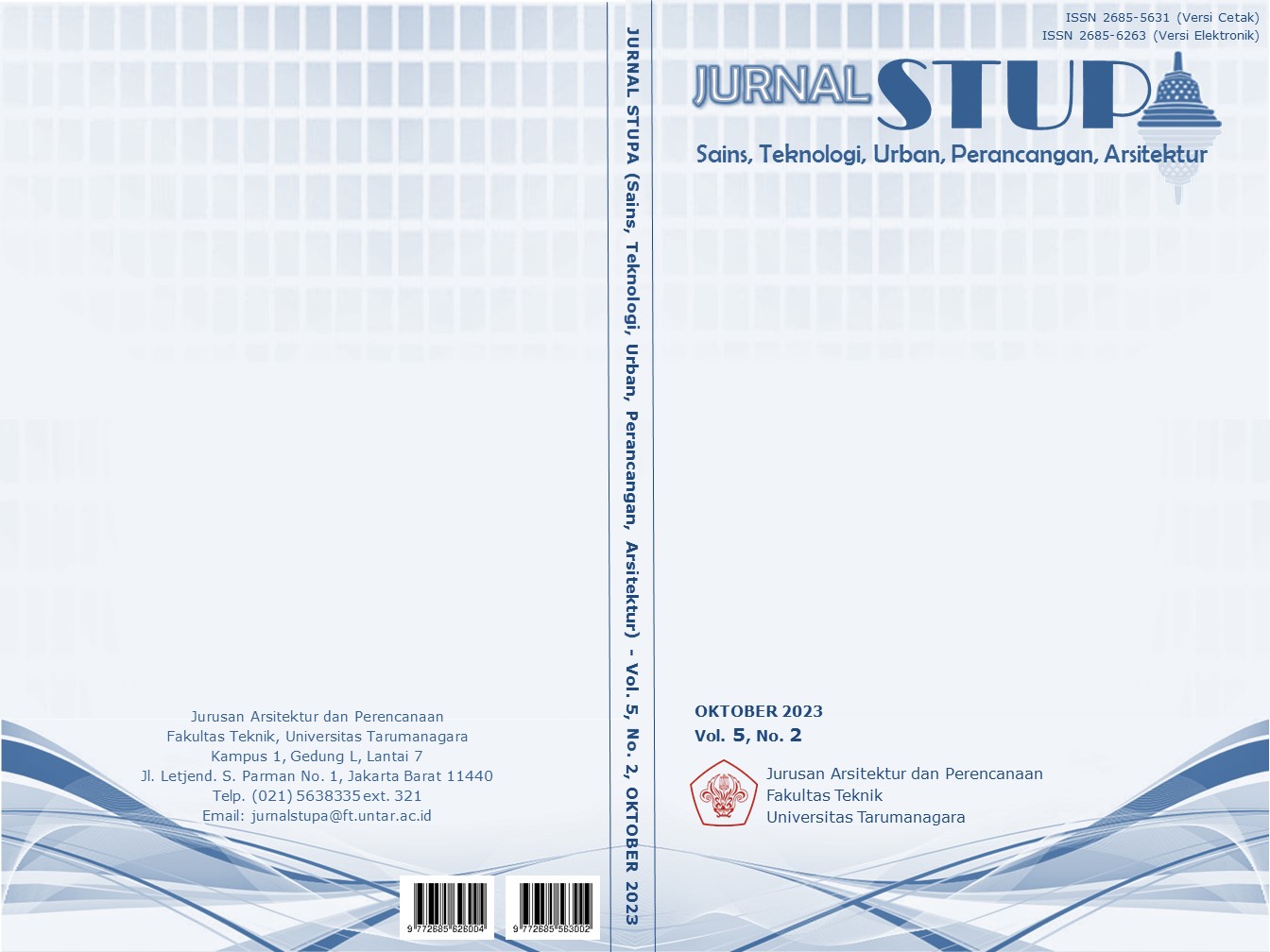EMPATI PERCAYA DIRI BAGI PEMUDA PAPUA DI JAKARTA DALAM PENDEKATAN PERANCANGAN PARA-PARA CENDRAWASIH
Main Article Content
Abstract
Responding to current developments, every community is required to be able to interact and cooperate with others to achieve the ideals of national progress as a whole on the basis of "Unity in Diversity". However, discrimination is still common in society against certain identities and ethnicities. So there is social inequality and barriers by society. Lack of empathy in society. Research on Papuan students and students who study in Jakarta, but they are often treated with discrimination and racism, which causes them to feel inferior and lack the confidence to actively interact in their social life freely and feel uncomfortable. In this case, there needs to be an approach and solution. Through sources of knowledge and information from Papuan children, what are the obstacles and problems that affect the limited space for movement and activities. Among them is the acceptance of their identity (Empathy for oneself), the uniqueness that is felt as an obstacle. How can they interact within the scope of diversity, of course, requires a space and program that can accommodate, through the approach and character of the Papuan children's activities themselves, the meeting point of Papuan children (homogeneous) but open to the public in the same space, With the existence of a transsis, forum for mental development (Mental Revolution), acceptance of self-identity, for Papuan children who start their education in Jakarta, In order to adapt to a heterogeneous urban environment. debriefing, the beginning is needed in order to be able to adapt and space for assembly and expression that can expose the characteristics of Papua.
Keywords: activity, adapt, interaction, diversity, meeting
Abstrak
Menyikapi perkembangan saat ini, setiap masyarakat dituntut untuk bisa keluar berinteraksi dan bekerja sama dengan sesama untuk mencapai cita-cita kemajuan bangsa secara menyeluruh dengan dasar “Bhineka Tunggal Ika”. Namun masih sering dijumpai diskriminasi yang terjadi didalam masyarakat terhadap identitas, etnis tertentu. Sehingga terjadi kesenjangan sosial dan sekat-sekat oleh masyarakat. Kurangnya rasa Empati dalam kalangan masyarakat. Penelitian terhadap Pelajar dan Mahasiswa/Mahasiswi Papua yang menuntut ilmu di Jakarta, namun mereka sering mendapat perlakuan diskriminasi dan rasisme, yang mengakibatkan mereka jadi minder dan kurang percaya diri untuk aktif berinteraksi dalam kehidupan sosialnya secara leluasa dan tidak merasa nyaman. Dalam hal tersebut perlu adanya pendekatan dan solusi, Melalui sumber pengetahuan dan informasi dari anak-anak Papua, apa kendala dan permasalahan yang mempengaruhi ruang gerak dan aktivitasnya terbatas. Diantaranya apakah penerimaan terhadap identitasnya (Empati terhadap diri Sendiri), keunikan yang dimiliki dirasa sebagai penghambat. Bagaimana caranya agar mereka bisa berinteraksi dalam lingkup keberagaman, tentunya membutuhkan sebuah ruang dan program yang bisa mewadahi, melalui pendekatan dan karakter Aktivitas anak-anak Papua itu sendiri, titik temu Anak-anak Papua (homogen) namun terbuka bagi umum dalam satu ruang yang sama. Dengan adanya suatu wadah stransis pembinaan mental (Revolusi Mental), penerimaan identitas diri, bagi anak-anak Papua yang mengawali pendidikan di Jakarta. Agar dapat beradaptasi dengan lingkungan perkotaan yang heterogen. pembekalan, awal dibutuhkan agar bisa beradaptasi dan ruang berkumpul dan berekspresi yang bisa mengekspos Karakteristik Papua.
Article Details
Section

This work is licensed under a Creative Commons Attribution-NonCommercial-ShareAlike 4.0 International License.
This work is licensed under a Jurnal Sains, Teknologi, Urban, Perancangan, Arsitektur/ STUPA Creative Commons Attribution-NonCommercial-ShareAlike 4.0 International LicenseReferences
Direktorat Jenderal Penataan Ruang (2006). Ruang Terbuka Hijau sebagai Unsur Utama Tata Ruang Kota. Retrieved from pu.go.id: https://pu.go.id/pustaka/biblio/ruang-terbuka-hijau-sebagai-unsur-utama-tata-ruang-kota/134BJ.
Hall, E. T. (1 Sep 1990). The Hidden Dimension. In L. A. Richard J. Neutra, Knopf Doubleday Publishing Group. Knopf Doubleday Publishing Group.
McAndrew & Palti (2018). Seeking Empathy in Conscious Cities
Madrazo, L. (1994). Durand and the Science of Architecture. Journal of Architectural Education, 48(1).
Manampiring, H. (2019). Filosofi Teras, filsafat Yunani-romawi kuno untuk Mental Tangguh Masa Kini. Jakarta: PT. Kompas Media Nusantara.
Myers, H. M. (2007). Social Psychology. Michigan: Michigan Hopecollege.
Pallasmaa, J., Mallgrave, HF, Robinson, S & Gallese, V. (2015). Architecture and Empathy. Finland: Tapio Wirkkala-Rut Bryk Foundation.
Psarra, S. (2009). Architecture and Narrative : The Formation of Space and Cultural Meaning. Abingdon-on-Thames: Routledge.
Raffoul, F. (2001). Heidegger and Practical Philosophy. Albany. SUNY Press.
Setiawan E. (2012-2023). Kamus Besar Bahasa Indonesia (KBBI) Empati. Retrieved from KBBI daring versi 2.9 Database utama edisi III: https://kbbi.web.id/empati
Sukarnoto, B. (2011). IMPLIKATUR DALAM PENGGUNAAN BAHASA INDONESIA OLEH SISWA SMA MUHAMMADIYAH 4 JAKARTA PADA JEJARING FACEBOOK DAN PERANCANGANNYA SEBAGAI BAHAN AJAR KETRAMPILAN MENULIS. Retrieved from http://repository.upi.edu: http://repository.upi.edu/8520/
Tissink, F. E. (2016). Narrative-drive Design: Roles of Narratives for Designing the Built Environment. Delft: TU Delft.
Winastya, K. P. (Selasa, 6 Desember 2022, 6 Desember Selasa). Contoh dan Penerapan Nilai-Nilai Pancasila dalam Kehidupan Sehari-hari. Retrieved from www.merdeka.com: https://www.merdeka.com/trending/contoh-dan-penerapan-nilai-nilai-pancasila-dalam-kehidupan-sehari-hari-kln.html.

